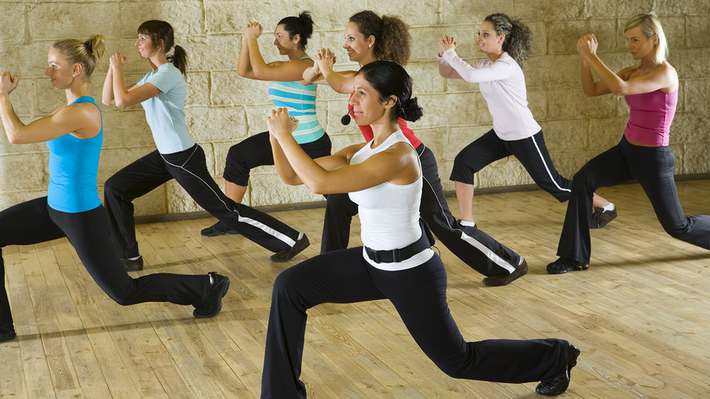Are Your Group Fitness Instructors Using the Right Words?
When we think of the fitness business, we often think of all things physical: After all, most gyms, healthcare centers, and other fitness facilities are centered around the movement of bodies. It's not a surprise that fitness instructors require a lot of knowledge about the human body across everything from maximizing results to minimizing the risk of injury.
But knowledge on its own is not enough. Fitness instructors also need the means through which to communicate this knowledge. Enter words. Here’s a closer look at why words matter so much, along with which words make the grade and which should be cut out of the fitness business lexicon.
Why Words Matter
Whether they’re providing instructions regarding which muscles to use or casually communicating with participants during a group class, the ability to communicate -- and communicate well -- cannot be overstated. Why? Because failure to communicate properly can lead to a range of undesirable outcomes, including everything from unnecessary injuries to loss of camaraderie and trust. In short, using words well can add up to an engaging member experience, while using the wrong ones can lead to disengagement -- a major problem for fitness centers with member retention on the mind.
Four Words That Don't Work
All of which begs the question: Which words are most appealing to members, and which fall short? The American Council on Exercise (ACE) recently highlighted four fitness terminologies for instructors to steer clear of, along with what words to use instead. These include:
1. “Newbie”
Aside from the obvious fact that calling someone a “newbie” may come off as dismissive and patronizing, words like “new” and “first time” can also be off-putting ones. Why? Because most people don’t enjoy being singled out -- let along singled out for being inexperienced. So how can instructors make sure to meet the needs of newcomers? Think inclusive, not exclusive.
Recommends ACE, “Rather than asking participants to raise their hand at the beginning of class to announce their new status, assume that you will have new attendees and frequent flyers in every class. Offer multiple exercise modification options for a range of abilities and preferences, and coach to accommodate a variety of needs.” ACE suggests using words like “let’s,” “ours,” and “us” to make everyone feel welcome and included.
2. “Easy”
“Easy” is a relative term. By calling a certain exercise or movement “easy,” instructors run the risk of making people of lesser abilities feel inferior. And words like “harder” and “level” aren’t any better. Why? Because they facilitate a competitive -- and often negative -- environment.
Instead, proposes ACE, “Encourage participants to listen to their bodies, and use words like option, choice, version, and variation. Even further, present the exercise options in no particular order, and when instructing, perform the lower- and middle-intensity options the most. Encourage individual autonomy in choosing the modification that feels appropriate. When participants feel a sense of control and success during their workouts, they are more likely to adhere to a consistent habit. With consistent participation, individuals will inevitably begin to choose more challenging options.”
3. “Sexy”
While some of your members may have the ultimate aim of a sexier, toned or shredded body, others have different goals. As a result, these kinds of words -- which emphasize the external rewards of exercise -- can be both off target and ineffective. Conversely, focusing on internal motivators and quantitative goals can have a more powerful and positive impact.
Says ACE, “Use power words like stronger, better, faster, stable or powerful. Focus on the intrinsic value of exercise, like how great it feels to complete a workout or be able to complete daily tasks and recreational activities with more vigor. Everyone in class can identify with these experiences, which creates a universal goal and a shared sense of accomplishment. This positive group effect and individual feeling of success will likely encourage more frequent individual participation, which may contribute to quantitative goals such as weight loss, while realizing the qualitative or intrinsic rewards of exercise.”

4. “Can’t”
Looking to empower? Avoid words like “can’t,” “don’t” and “should.” Why? Because according to ACE, they “remind us of times when someone scolds us or told us what to do.” Your members aren’t looking to be preached at, talked down to, belittled, or judged. Rather, they’re looking for partnership toward their ultimate goals.
Continues ACE, “Rather than phrasing directions around what to avoid, such as ‘Don’t let your back round when you bend over,’ ask for what is desired, such as ‘Hinge at the hips and brace the core to keep the spine straight.’ Instead of emphasizing inability, such as, ‘If you can’t do a full push up, drop to your knees,’ focus on ability: ‘Complete 10 push-ups with a strong core and straight spine on either your toes or your knees.’ Eliminating negative words from coaching helps participants focus on what they can and should do, rather than worrying about what to avoid.”
Fitness instructors can make or break the success of your fitness center. And while who they are matters, something else does, too: the words they use. Just as using the right words can motivate and inspire your clients, using the wrong ones can have the opposite impact. The takeaway for fitness businesses? Educating your fitness instructors, personal trainers and other staff members on the subject can not only help them perform their own jobs better, but can also create a more satisfying member experience and supportive culture within your community.
Another way to boost your fitness business? Fitness monitoring technology. Request a demo today to learn more about what the Accurofit System can do for you.




Join the conversation